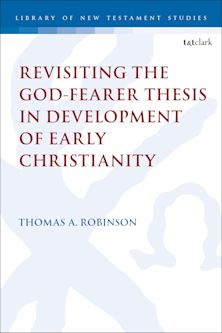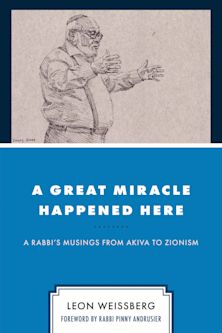- Home
- ACADEMIC
- Religious Studies
- Judaism
- Halakha and the Challenge of Israeli Sovereignty
Halakha and the Challenge of Israeli Sovereignty
This product is usually dispatched within 1 week
- Delivery and returns info
-
Free US delivery on orders $35 or over
You must sign in to add this item to your wishlist. Please sign in or create an account
Description
Halakha and the Challenge of Israeli Sovereignty examines the issues surrounding national, political, and religious sovereignty from the vantage point of halakha and its evolution. The work analyzes the efforts of the interpretative communities who adhered to halakha—the rabbinical authorities—as well as other groups who endeavored to help or to change it: the Jewish jurists in Eretz Israel who sought to integrate sections of halakha into the Jewish collective; and the religious academics who wanted more meaningful recognition of halakha in non-halakhic values. The assessment extends from the beginning of the Jewish national movement in the last two decades of the 19th century to the first two decades of the State of Israel, when weighty problems arose that required a halakhic response to the challenge of sovereignty.
In this, the volume sheds light on the pliable nature of the concept of halakha, particularly in conjunction with its application to the notion of sovereignty.
Table of Contents
1 The Halakha in the Face of Modernity and Zionism
Reform, Orthodoxy, Modernity
Nationalism and Zionism
The Shmita Debate of 5649 (1888–1889)
2 “Government in the Spirit of the Talmud”: The Pioneering Discussion of Zeev Jawitz (1904)
Between Theocracy and the Separation of State and Religion
Religion and Political Life
Religion and Science
Religion and Life
3 The Balfour Declaration and the Pioneering Debate on Halakha and the Challenge of Sovereignty (1917–1921)
Against the Separation of Religion and State
Restoration of the Sanhedrin
Democracy and Halakhic Reforms
Mishpatey HaMeluchah—The Proposal of a Separate
Monarchical Legal System
National Acceptance of Halakha
4 The Age of Jurists (1918–1948)
Jewish Law as Zionist Law
Enactments, Not Amendments
Abraham Chaim Freimann
Isaac Breuer 1
5 The Rabbinical Debate on the Eve of the Establishment of the State of Israel and in its Early Years (1947–1953)
The Chief Rabbinate of Israel: Halakha in the Grip of Democracy
The Status of Non-Jewish Minorities
A Daughter’s Inheritance
Leo Cohen’s Draft of Constitution
American Rabbis: Democratic Halakha
6 The Younger Generation of Zionist Rabbis Faces the Challenge of Sovereignty (1948–1962)
Halakhic Validation: The Theoretical Halakhic Debate on Diverse Aspects of State Institutions
Religious Legislation
Halakha That Regulates and Halakha That Challenges: Renewing Halakhot of Battle and the Army
7 Religious Academics and the Challenge of Sovereignty (1948–1967)
”Permissive State or Torah State”—Criticizing the Need to Make Halakha More Flexible in Order to Adapt It to Reality
Observing the Sabbath in the State of Israel
The Status of Women
Ephraim Elimelech Urbach and the Movement for Torah Judaism
Epilogue
Bibliography
Index
About the Author
Product details
| Published | May 24 2019 |
|---|---|
| Format | Hardback |
| Edition | 1st |
| Extent | 220 |
| ISBN | 9781498534970 |
| Imprint | Lexington Books |
| Dimensions | 9 x 6 inches |
| Publisher | Bloomsbury Publishing |
About the contributors
Reviews
-
With the emergence of Zionism and the quest for a Jewish state, a series of issues involving a confrontation between modern Jewish sovereignty and traditional Jewish law, Halakha, developed. Asaf Yedidya's focuses on a number of the major issues and has written a book containing his fine analyses that is a significant contribution to the historical and social scientific study of Halakha
Chaim I. Waxman, Hadassah Academic College; Rutgers University (Emeritus)
-
This fascinating book sheds light on one of the challenging issues of modern Jewish life-the meeting between Zionism and Halakha. This includes the dilemmas and conflicts within the State of Israel concerning the place of Halakha in its life, and the place of Israel in the Halakhic world. It is well-written, sources-rich and highly informative, putting subjects and personalities into their historic context.
Justice Professor Elyakim Rubinstein, Deputy President (Ret.), The Supreme Court Of Israel



































